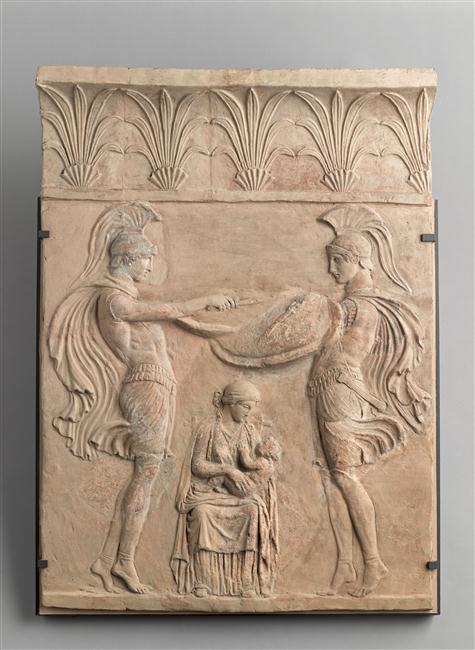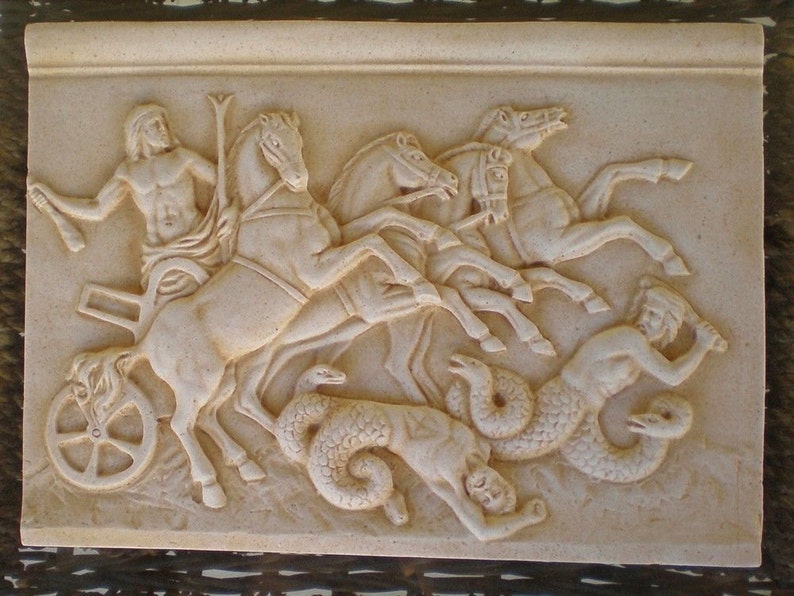Zeus
Zeus was the preeminent deity in Greek mythology, often referred to as the King of the Gods. His domain extended over various aspects of the natural and cosmic order, reflecting his status as a supreme ruler and arbiter of destiny.

Residence: Mount Olympus
Symbols: Thunderbolt, Eagle, Bull and Oak
Parents: Cronus and Rhea
Siblings: Hestia, Hades, Hera, Poseidon, Demeter, Chiron
Consort: Hera
Children: Aeacus, Agdistis, Angelos, Aphrodite, Apollo, Ares, Artemis, Athena, Dionysus, Ilithyia, Enyo, Epaphus, Eris, Ersa, Hebe, Helen of Troy, Hephaestus, Heracles, Hermes, Lacedaemon, Minos, Pandia, Persephone, Perseus, Rhadamanthus, the Graces, the Horae, the Litae, the Muses and the Moirae
Roman equivalent: Jupiter
As the god of the sky, Zeus controlled the weather, wielding thunderbolts and lightning as his primary symbols of power. He was also associated with the concept of law and order, ensuring justice and maintaining harmony among both gods and mortals. Additionally, Zeus was considered the overseer of destiny and fate, shaping the course of events in the mortal world and beyond.
Depicted as a mature and authoritative figure, Zeus was often portrayed with a regal demeanor, characterized by a sturdy physique and a dark, flowing beard. His royal attributes included a lightning bolt, which served as both a weapon and a symbol of his authority, as well as a sceptre denoting his kingship and dominion over the gods.
Furthermore, Zeus was frequently accompanied by an eagle, a majestic bird revered as a symbol of power and divine favor. This association emphasized his sovereignty over the heavens and his role as the supreme ruler of the Olympian pantheon.
Birth
Cronus, fearful of a prophecy foretelling his downfall at the hands of his own offspring, devoured each of his children immediately upon their birth. Rhea, his wife, distraught by this cycle of infanticide, sought counsel from Gaia and Uranus to devise a plan to save their next child, Zeus. Determined to spare her newborn son from Cronus’s fate, Rhea secretly gave birth to Zeus in Crete. Instead of presenting the infant to Cronus, she cunningly wrapped a rock in swaddling clothes and offered it to him, which he unsuspectingly swallowed.

This strategic act ensured Zeus’s survival and set the stage for the eventual overthrow of Cronus, fulfilling the prophecy and reshaping the hierarchy of the gods.
Infancy
He was raised in secrecy on Mount Dikte in Crete, where he was nurtured by nymphs on the milk of the goat Amalthea and sheltered by the warrior Curetes. These fierce guardians drowned out the sound of his crying with their rhythmic shield-clashing battle-dance, ensuring that his existence remained concealed from the jealous eyes of Cronus.

Becoming King of the Gods
After coming of age, Zeus compelled Cronus to regurgitate first the stone, and then his siblings in reverse order of swallowing. Metis had provided Cronus with a magical potion to induce him to disgorge the infants. Subsequently, Zeus liberated the brothers of Cronus, the Hecatoncheires and the Cyclops, from their incarceration in Tartarus, defeating their guardian, Campe, in the process.

In gratitude, the Cyclops bestowed upon him thunder and the thunderbolt, treasures previously concealed by Gaia. United with his siblings, the Hecatoncheires, and the Cyclops, Zeus led the rebellion against Cronus and the Titans, a conflict known as the Titanomachy. Following their victory, the vanquished Titans were cast into Tartarus. Atlas, among the Titans who had opposed Zeus, was punished by being condemned to bear the weight of the sky.
Following the battle with the Titans, Zeus, Poseidon, and Hades divided the realm through drawing lots: Zeus gained dominion over the sky and air, Poseidon over the sea, and Hades over the underworld. The primordial Earth, Gaia, remained unclaimed; it was shared among all three brothers, with each exercising authority in accordance with their abilities. This division elucidates why Poseidon was known as the “earth-shaker,” governing earthquakes, while Hades claim those who had died on earth.
Birth of Athena
Zeus, captivated by the wisdom of the goddess Metis, pursued her and eventually seduced her. However, upon learning of her pregnancy, Zeus grew apprehensive. Aware of the prophecy foretelling that Metis’ children would surpass him in wisdom, Zeus feared being overthrown by his own offspring. To avert this fate, Zeus resorted to cunning.

He deceived Metis into allowing him to swallow her whole, hoping to absorb her wisdom and prevent the birth of their child. Yet, unbeknownst to Zeus, Metis had already conceived before being consumed. As time passed, Zeus began to experience excruciating headaches, which tormented him relentlessly.
In desperation, Zeus sought relief from his agony. He commanded Hephaestus, the skilled craftsman of the gods, to cleave open his head with the labrys, a double-headed Minoan axe. Hephaestus complied with the directive, splitting Zeus’s skull apart. From the fissure emerged Athena, fully grown and adorned in armor, emanating wisdom and valor. Thus, Athena, the goddess of wisdom and strategic warfare, sprang forth from Zeus’s head, alleviating his suffering and affirming her divine origin.
Zeus’s Affairs
Zeus had a reputation for his numerous romantic escapades, both with immortals and mortals, resulting in a plethora of myths surrounding his amorous conquests.

Hera, his wife and queen of the gods, often found herself in a tumult of jealousy over Zeus’s infidelities. To distract Hera from his affairs, Zeus sometimes employed the nymph Echo, whose incessant chatter could divert the queen’s attention. However, when Hera uncovered this ruse, she inflicted a curse upon Echo, condemning her to forever repeat the words of others.
In many of his dalliances, Zeus employed cunning disguises to seduce his unsuspecting paramours, much like he had done with Hera. These transformations allowed Zeus to approach his love interests without arousing suspicion, thereby facilitating his romantic conquests while evading the wrath of his ever-watchful wife:
- Aegina, an eagle.
- Alcmene, Amphitryon.
- Antiope, a satyr.
- Asopis, fire.
- Callisto, Artemis.
- Cassiopeia, Phoenix.
- Danae, a shower of gold.
- Europa, a bull.
- Eurymedusa, an ant.
- Ganymede, an eagle.
- Imandra, a shower.
- Lamia, a lapwing.
- Leda, a swan.
- Manthea, a bear.
- Mnemosyne, a shepherd.
- Nemesis, a goose.
- Persephone, a serpent.
- Semele, fire.
- Thalia, a vulture.
Art









